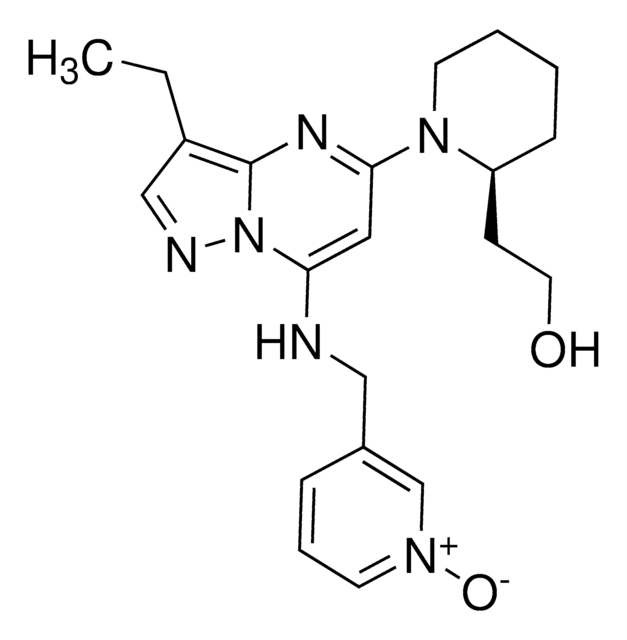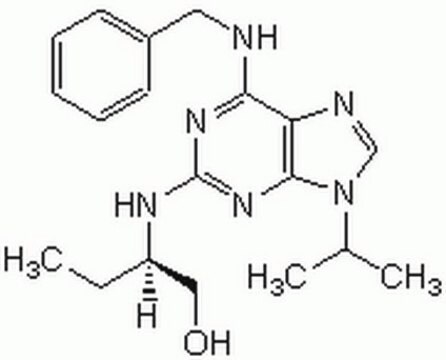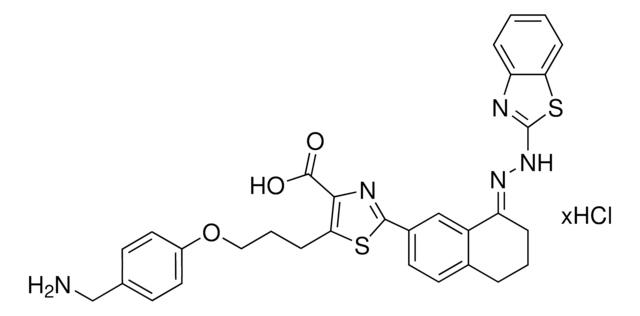SRP4702
CTGF human
recombinant, expressed in E. coli, ≥95% (SDS-PAGE), ≥95% (HPLC)
Synonym(s):
connective tissue growth factor
Sign Into View Organizational & Contract Pricing
All Photos(1)
About This Item
Recommended Products
biological source
human
recombinant
expressed in E. coli
Assay
≥95% (HPLC)
≥95% (SDS-PAGE)
form
lyophilized
potency
501.0-2.0 μg/mL ED50
mol wt
~11.2 kDa
packaging
pkg of 20 μg
impurities
endotoxin, tested
NCBI accession no.
UniProt accession no.
shipped in
wet ice
storage temp.
−20°C
Gene Information
human ... CTGF(1490)
General description
The gene CTGF (connective tissue growth factor) is mapped to human chromosome 6q23.2. CTGF is a member of the CCN (Cyr61, CTGF , Nov) family of secreted cysteine rich regulatory proteins and is the major mitogenic and chemoattractant protein produced by umbilical vein and vascular endothelial cells. The protein has an N-terminal secretory signal peptide and four domains (an insulin-like growth factor-binding protein domain, a Von Willebrand factor domain, a thrombospondin type-1 repeat module, and a CT). It is expressed in various tissues, such as connective tissue, heart, brain, kidney, lung, liver, muscle, pancreas gland and placenta. Recombinant human CTGF is a 11.2Da protein of 98 amino acid residues.
Biochem/physiol Actions
CTGF (connective tissue growth factor) stimulates the proliferation and differentiation of chondrocytes, induces angiogenesis, promotes cell adhesion of fibroblasts, endothelial, and epithelial cells. It binds to IGF (insulin growth factor), TGF (transforming growth factor) β1 and BMP (bone morphogenetic protein)-4. CTGF plays a crucial role in the progression of diabetic nephropathy. It can work as an oncoprotein in glioma and melanoma. However, it works as a tumor suppressor in lung cancer and colon cancer.
Physical form
Sterile filtered and Lyophilized without additives.
Reconstitution
Centrifuge the vial prior to opening. Avoid freeze-thaw cycles.
Reconstitute in water to a concentration of 0.1-1.0 mg/mL. The solution can then be diluted into other aqueous buffers.
Storage Class Code
11 - Combustible Solids
WGK
WGK 3
Flash Point(F)
Not applicable
Flash Point(C)
Not applicable
Certificates of Analysis (COA)
Search for Certificates of Analysis (COA) by entering the products Lot/Batch Number. Lot and Batch Numbers can be found on a product’s label following the words ‘Lot’ or ‘Batch’.
Already Own This Product?
Find documentation for the products that you have recently purchased in the Document Library.
Hsiao-Chi Tsai et al.
Oncotarget, 5(11), 3800-3812 (2014-07-09)
Osteosarcoma, the most common primary malignant bone tumor, shows potent capacity for local invasion and distant metastasis. Connective tissue growth factor (CTGF/CCN2), a secreted protein, binds to integrins, modulates invasive behavior of certain human cancer cells. Effect of CTGF in
Effects of CTGF/Hcs24, a hypertrophic chondrocyte-specific gene product, on the proliferation and differentiation of osteoblastic cells in vitro.
Nishida T, et al.
Journal of Cellular Physiology, 184, 197-206 (2000)
S-C Liu et al.
Cell death & disease, 5, e1485-e1485 (2014-10-24)
Connective tissue growth factor (CTGF, a.k.a. CCN2) is inflammatory mediator and abundantly expressed in osteoarthritis (OA). Angiogenesis is essential for OA progression. Here, we investigated the role of CTGF in vascular endothelial growth factor (VEGF) production and angiogenesis in OA
Sandi G Dempsey et al.
Journal of proteome research, 18(4), 1657-1668 (2019-03-19)
Ovine forestomach matrix (OFM) is a decellularized extracellular matrix (dECM) biomaterial that serves as a scaffold for remodeling damaged soft tissue. dECM biomaterials are used in a variety of clinical applications, and their regenerative capacity is encoded not only in
The Twisted gastrulation family of proteins, together with the IGFBP and CCN families, comprise the TIC superfamily of cysteine rich secreted factors.
Vilmos P, et al.
Molecular Pathology, 54, 317-323 (2001)
Our team of scientists has experience in all areas of research including Life Science, Material Science, Chemical Synthesis, Chromatography, Analytical and many others.
Contact Technical Service







